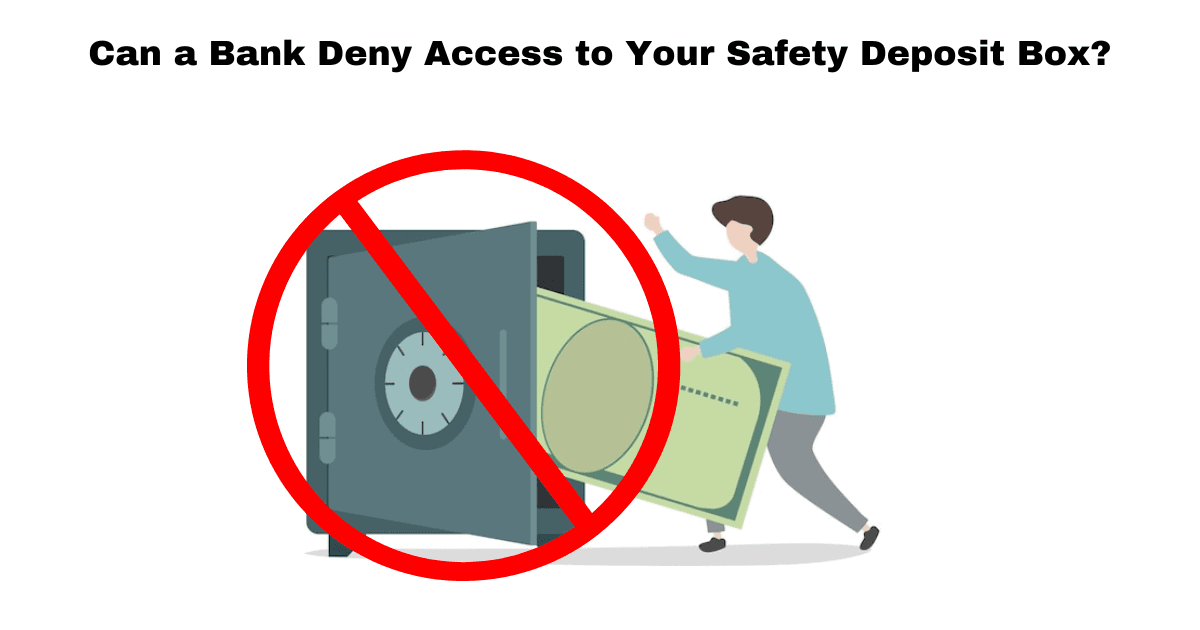
What are Safe Deposit Boxes?
When safeguarding our belongings, many of us rely on safe deposit boxes. These secure storage units, provided by banks and financial institutions, offer reassurance that our important documents, heirlooms, and other valuable items are protected.
But what happens if abank denies access to your safe deposit box?In this article, I will delve into the purpose and benefits of having a safe deposit box, explore the legalities surrounding them, and address the question on everyone's mind: can a bank truly deny you access to your belongings?
- Safe deposit boxes, offered by banks, secure important documents and valuables, governed by legal regulations.
- Access denial may occur due to unpaid fees, agreement violations, or suspicion of illicit activities.
- Seek immediate clarification from the bank if denied access, and consider legal assistance if necessary.
- Trust and estate lawyers specialize in resolving access issues and navigating legal complexities.
- Effective estate planning includes safe deposit box considerations, ensuring smooth asset transfer.
- Protect assets by maintaining detailed inventories, obtaining insurance, and regularly reviewing agreements.
- While banks require valid cause for access denial, proactive measures reduce risks and ensure asset protection.
Understanding Safe Deposit Box Regulations:
Safe deposit boxes in Florida probate are governed by specific laws and regulations to ensure the security of the bank and the box holder.
When you rent a safe deposit box, you enter into a contractual agreement with the bank, outlining the terms and conditions of use.
These agreements typically grant the bank limited liability for the box's contents, while also establishing the rights and responsibilities of the box holder.
It is essential to carefully review and understand the terms of this agreement before renting a safe deposit box to avoid any potential disputes or complications in the future.
Suggested Read:
Accessing Safety Deposit Boxes After Death: A Florida Probate Law Guide
Can a bank deny you access to your safe deposit box after your passing?
Now, let's address the burning question: can a bank deny you access to your safe deposit box?
- While banks generally only have the authority to allow access to your safe deposit box with proper cause, there are circumstances in which they may do so.
- For example, if there is a court order, a search warrant, or a government investigation involving the contents of your box, the bank may be required to restrict access.
- Additionally, if you fail to pay the rental fees or violate the terms of the agreement, the bank may have grounds to deny you access to your box.
- However, banks must follow due process and provide you with sufficient notice and an opportunity to address any issues before denying access.
Reasons why a bank may deny access to a safe deposit box
There are several reasons why a bank may deny access to your safe deposit box. Below are some of the most common reasons for access denial to your safe deposit box:
- Failure to Pay Rental Fees: One common reason is the failure to pay the rental fees. If you fall behind on your payments, the bank may suspend your access until the fees are settled.
- Violation of Agreement Terms and Conditions: Another reason could be a violation of the terms and conditions outlined in the agreement. For example, if you attempt to store illegal substances, hazardous materials, or other prohibited items in your box, the bank may deny you access.
- Illicit and Fraudulent Activities: Furthermore, if the bank suspects fraudulent activity or illegal transactions involving your safe deposit box, they may take appropriate measures to protect their interests, including denial of access.
What to do if your bank denies access to your safe deposit box?
- If you are denied access to your safe deposit box without proper cause, it is crucial to take immediate action.
- Start by contacting the bank and requesting an explanation for the denial. There may have been a misunderstanding or an administrative error.
- If the issue persists, consider seeking legal assistance from trust and estatelawyers specializing in wills and trusts.
- They can guide you through the legal process, review your contractual agreement, and help you assert your rights to access your safe deposit box.
Maintaining composure and professionalism throughout this process is advisable to achieve the best possible outcome.
Seeking Legal Assistance: The Role of a Trust and Estates Lawyer
- When facing a denial of access to your safe deposit box, enlisting the help of a trust and estates lawyer can be invaluable.
- These legal professionals specialize in estate planning, asset protection, and property rights.
- They are well-versed in the laws surrounding safe deposit boxes and can navigate the complex legal landscape on your behalf.
- A trust and estates lawyer will review your contractual agreement, assess the circumstances leading to the denial, and strategize the best course of action to secure your access.
- Their expertise and guidance can make a significant difference in resolving the issue effectively and efficiently.
Estate planning considerations for safe deposit boxes
As the old saying goes, "An ounce of prevention is worth a pound of cure."
When managing safe deposit boxes, effective estate planning is crucial for facilitating the smooth transfer of your assets. When renting a safe deposit box, you should certainly include it in your estate plan. Including your safe deposit box in your estate plan helps reduce the risk of access denial and ensures your loved ones can smoothly handle your affairs in your absence.
The following steps can come in handy while renting a safe box:
- Clearly outline your wishes regarding the contents of the box,
- Designate a trusted individual to access it in case of your incapacity or passing,
- Provide clear instructions on how to handle its contents.
Tips for protecting your assets in a safe deposit box
While safe deposit boxes offer a high level of security, it's crucial to take specific precautions to safeguard your assets.
- Firstly, ensure that you have an updated inventory of the contents of your box, including photographs and appraisals of valuable items. This documentation will be invaluable in case of loss, theft, or damage.
- Additionally, consider insuring the contents of your safe deposit box with a reputable insurance provider. This additional layer of protection can provide financial compensation in unforeseen circumstances.
- Lastly,regularly review the terms and conditions of your estate planand rental agreement to ensure it aligns with your needs and expectations.
Conclusion: Ensuring Access to Your Safe Deposit Box
In conclusion, the question of whether a bank can deny access to your safe deposit box is a complex one. While banks generally do not have the authority to deny access without proper cause, there are circumstances in which they may do so.
It is crucial to understand the legalities surrounding safe deposit boxes, carefully review your rental agreement, and promptly address any issues.
If your bank denies you access without valid cause, seeking legal assistance from aTrust and estate lawyer specializing in resolving these mattersis highly recommended. By incorporating your safe deposit box into your estate plan and taking necessary precautions, you can minimize the risk of access denial and safeguard your valuable assets.
Useful Resources:
- Letters of Administration. What are they and how can you obtain one?
- As a Trust Beneficiary Can You Waive Your Right to an Accounting?
- Durable Power of Attorney. Top 5 reasons why you need them?

